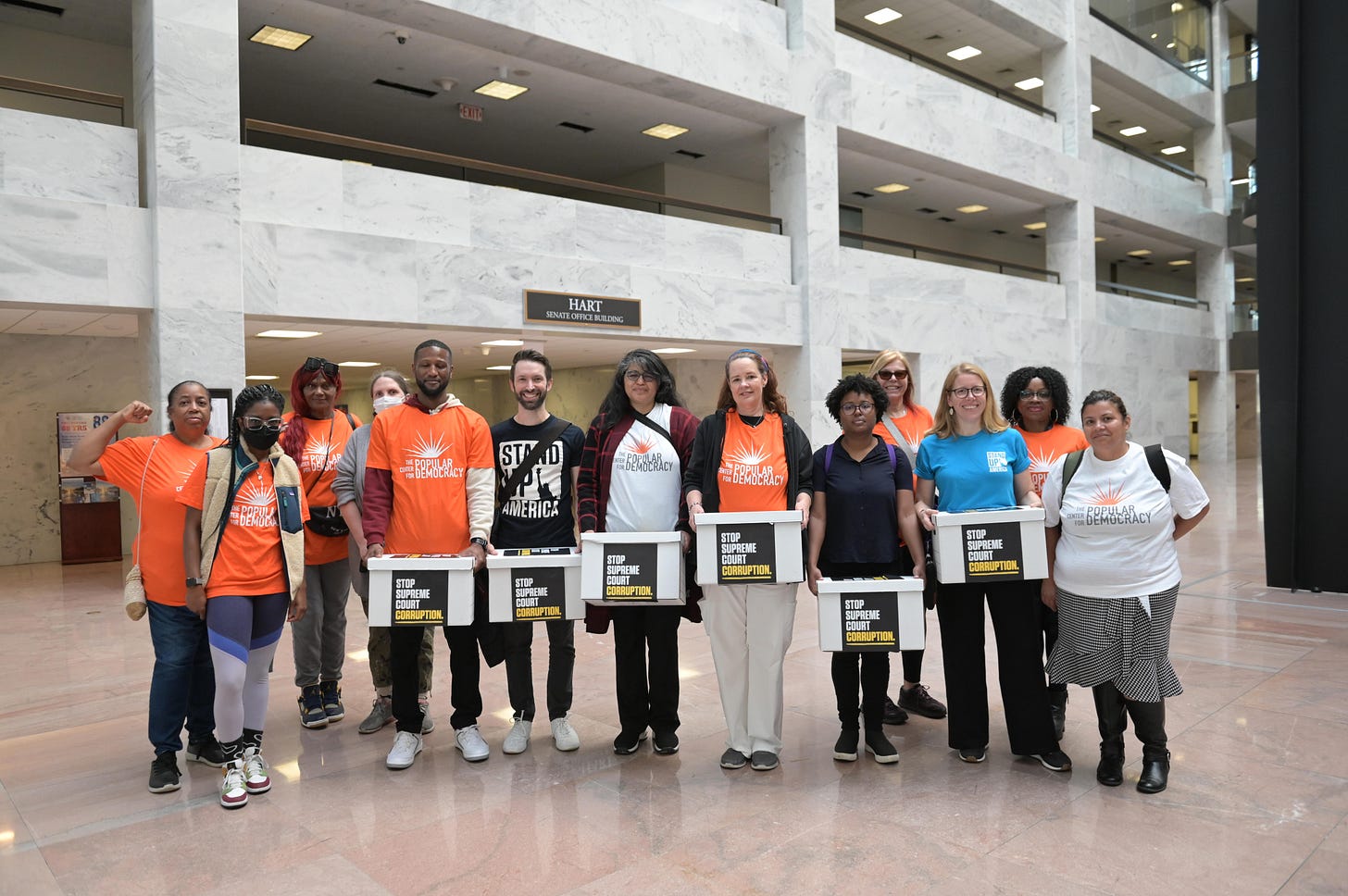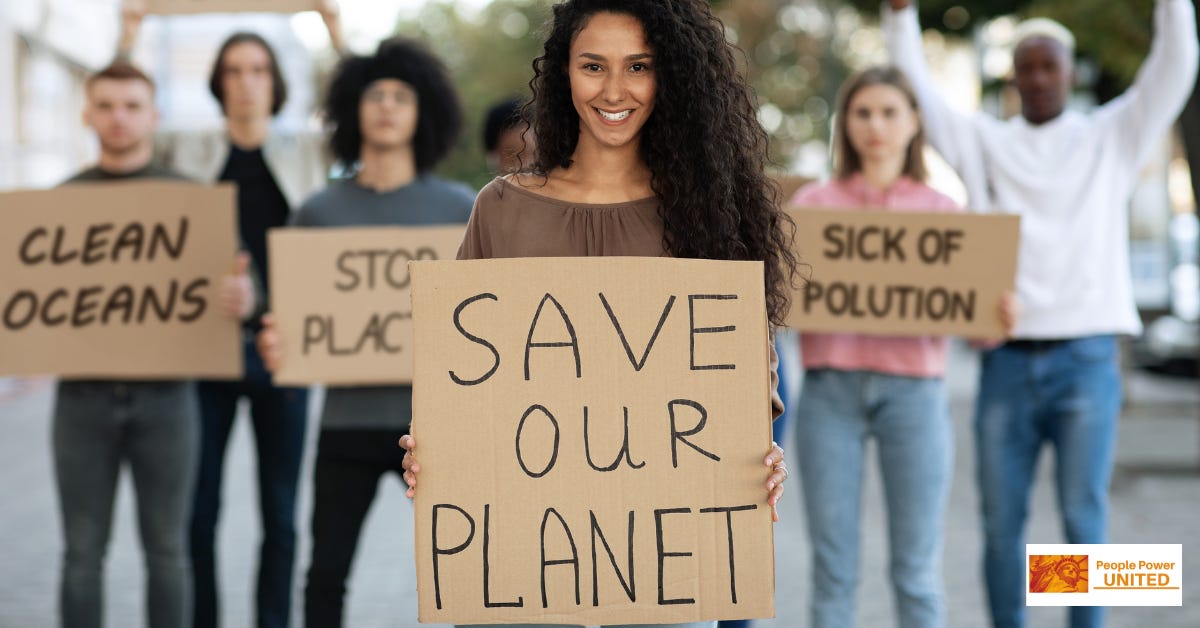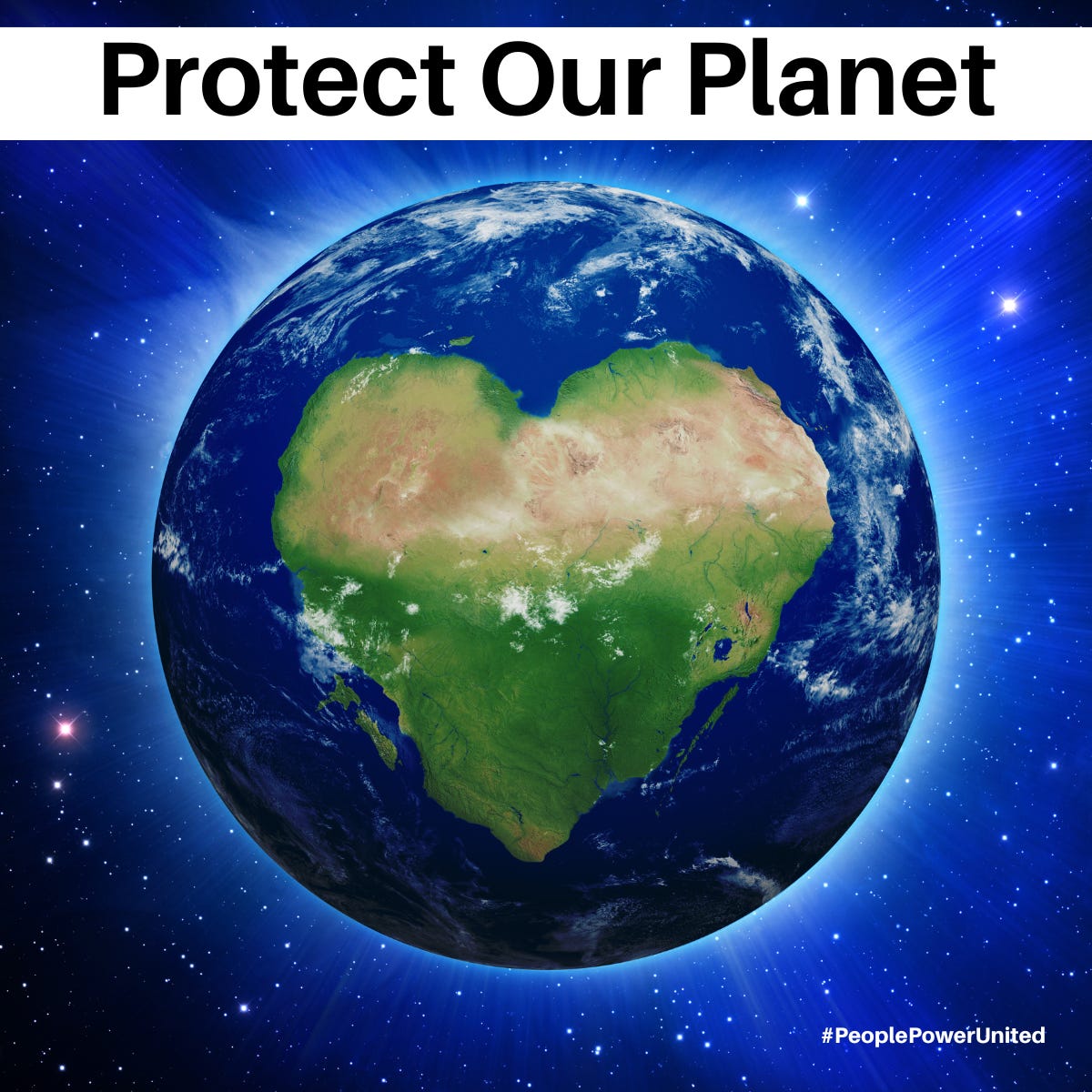Together, we can Protect Our Planet
🌎 Climate change poses an urgent and immediate danger to our environment, our planet, and the very future of life on Earth. Together, we can protect our planet.
Today in 🌎 Protect Our Planet, we’re featuring: November 13, 2024 news briefs and calls-to-action.
Together, we can Protect Our Planet
Climate change poses an urgent and immediate danger to our environment, our planet, and the very future of life on Earth. We must stand strong in the face of these threats and take action to educate and empower our communities. Together, we can protect our environment, preserve the beauty and biodiversity of our planet, and ensure a sustainable future for all. Join us in defending our planet and fighting climate change-take action today!
Together, we can Protect Our Planet
Click here to Tell Trump's EPA Staff: Stop Lying About Your Record
Click here to Tell the Fed to Fight Climate Change
BONUS
Call your member of Congress today (202) 224-3121 and ask them to support bills that protect our planet
Click here to upgrade your subscription or become a paid subscriber
Register to vote, vote, and help elect leaders committed to protecting our planet
Click here to Save the Bees
Click here to Tell the EPA: Protect frontline communities from the harms of vinyl chloride!
Click here to signup for our next training: Stop Project 2025: Mobilize for Change
Give us a ❤️ heart and leave a comment on this post
Share this post on your social media channels
Stay connected, get Protect Our Planet on the Substack app
Protect Our Planet - News Briefs - November 13, 2024
Soaring grocery prices helped Trump to victory. The climate crisis is only going to make this worse
The Guardian By James Meadway
Butter prices have risen more than 80% across Europe, as climate change-linked bluetongue fever has hit cattle herds. Orange juice prices have doubled in a year in the US, as extreme heat, floods and droughts have knocked out fruit harvests in Brazil and Florida. … The world we live in now is one where geopolitical conflict intersects with the climate crisis to produce repeated, sometimes dramatic, shocks and shortages.
Four Tropical Storms Rage Simultaneously Near the Philippines
New York Times By Jin Young
While weather experts have yet to conclude that global warming is a direct cause of the increased storm activity this month, they say it could be a factor. Sea surface temperatures have been steadily rising and reached a record high last year.
Analyzing Trump's cabinet picks so far. And, Biden's intimate view of the White House
NPR By Brittney Melton
He made the pledge to fight global warming at the COP29 Climate Summit, which is underway this week. • 🎧 The U.K. plans to reach this goal by investing in climate solutions like wind energy, solar, big batteries and nuclear energy, NPR's Julia Simon says. … President-elect Trump has previously called climate change a hoax. Each day this week, Morning Edition will dive deep into one of the promises President-elect Donald Trump has made for day one of his administration. Trump has promised to boost America's fossil fuel industry. … Brian Murray, director of the Nicholas Institute for Energy, Environment & Sustainability at Duke University, speaks with NPR's A Martínez about what that would mean for the U.S.' climate goals.
Pakistan's smog is visible from space. This activist is 'frustrated' but won't give up
NPR By Kamala Thiagarajan
The minister, Marriyum Aurangzeb, is in charge of environmental protection and climate change in Pakistan's most populous province, Punjab. She said the lockdown was in response to " — so bad that UNICEF's representative in Pakistan, , said the smog was visible from space .
Climate Summit, in Early Days, Is Already on a 'Knife Edge'
New York Times By David Gelles, Brad Plumer
Trump has called climate change a hoax and has said he plans to pull out of the Paris climate accord. "Things are on a knife edge," said Avinash Persaud, a climate change adviser at the Inter-American Development Bank.
Boston Globe By Erin Douglas Verified
Many federal grants finance beach cleanups, water quality testing, and other programs to manage the marine environment, said Jeff Watters, vice president of external affairs of the Ocean Conservancy, a nonprofit organization.
Lee Zeldin Knows How to Defend Trump. Will He Defend the Environment?
By Nicholas Fandos, Lisa Friedman
Protect Our Planet - Video Highlights - November 13, 2024
COP29: UN Climate Change Conference In Baku | World News | WION Climate Tracker | WION
Climate scientists say 2024 is the hottest year on record | 5News
Environmental harms from Project 2025:
Ends programs addressing climate change.
Eliminates much of the Environmental Protection Agency (EPA).
Cancels regulations to reduce environmental harm.
Increases oil drilling, coal mining, and natural gas extraction.
Deregulates big businesses and oil companies.
Stops expanding the electrical grid for wind and solar energy.
Cuts renewable energy funding.
Removes the U.S. from international climate agreements.
Stops climate change research.
Repeals tax subsidies for clean energy, including credits and tax breaks for green energy companies.
People Power United’s Statement on Protect Our Planet
In response to recent MAGA shenanigans to enact Project 2025 and harm our environment, People Power United - a progressive grassroots group - issued the following statement:
“Our planet is under attack as the MAGA agenda seeks to reward the rich and powerful at the expense of our environment. Climate change poses an urgent and immediate danger to our environment, our planet, and the very future of life on Earth. We must stand strong in the face of these threats and take action to educate and empower our communities. Together, we can protect our environment, preserve the beauty and biodiversity of our planet, and ensure a sustainable future for all. There is no power like that of the people, and People Power United stands ready to protect our communities against any and all injustices,” said Laurie Woodward García of People Power United.
People Power United will continue to oppose such harm to our community and champion civil rights for all.
The Urgency of Climate Change: Why We Must Act Now
Climate change is not a distant or abstract issue—it is a present and accelerating crisis that threatens the stability of ecosystems, economies, and societies worldwide. The scientific consensus is clear: human activities, particularly our reliance on fossil fuels, are driving an unprecedented increase in global temperatures. This rise in temperature is already causing devastating consequences, from extreme weather events to habitat loss and species extinction. Despite the overwhelming evidence, many still underestimate the severity of climate change or feel helpless to make a difference. This essay argues why taking climate change seriously is essential for our survival and provides actionable steps we can all take to help mitigate its effects.
Why We Should Take Climate Change Seriously
The evidence of climate change is all around us, and it grows more apparent with each passing year. From wildfires ravaging forests to hurricanes intensifying in frequency and strength, climate change is already impacting communities globally. According to the Intergovernmental Panel on Climate Change (IPCC), global temperatures have already risen by about 1.1 degrees Celsius above pre-industrial levels, and if we continue with business as usual, we risk surpassing the critical 1.5-degree threshold within the next decade. Exceeding this limit could result in catastrophic consequences, including widespread crop failures, rising sea levels, more frequent and severe natural disasters, and irreversible damage to natural ecosystems.
One reason we must take climate change seriously is that it poses a direct threat to human health. Rising temperatures and changing precipitation patterns can lead to an increase in infectious diseases, exacerbate respiratory and cardiovascular conditions, and contribute to mental health issues due to the trauma and anxiety of coping with extreme weather events. Additionally, climate change disproportionately affects the most vulnerable communities, often those who have contributed the least to global emissions. Low-income populations, Indigenous communities, and countries in the Global South face the harshest consequences, from food and water shortages to forced migration due to uninhabitable conditions.
Furthermore, the economic cost of inaction is staggering. The damage caused by extreme weather events costs billions of dollars every year, impacting infrastructure, agriculture, and public health. If we fail to address climate change, these costs will only escalate, leading to severe economic instability. Conversely, taking climate action can create millions of new jobs in renewable energy, sustainable agriculture, and green infrastructure.
What We Can Do: Practical Actions to Reduce Our Carbon Footprint
While the challenge of climate change may seem insurmountable, each of us has the power to contribute to solutions. By making small changes in our daily lives and encouraging others to do the same, we can collectively reduce greenhouse gas emissions and create a culture that values environmental stewardship. Here are some practical actions individuals can take at home and work to help mitigate global warming:
Actions to Take at Home
Reduce Energy Consumption: Use energy-efficient appliances, switch to LED lighting, and consider smart thermostats to minimize electricity use. Turning off lights and unplugging devices when not in use also helps reduce energy waste.
Switch to Renewable Energy Sources: If available, choose green energy options from your utility provider, such as wind or solar power. Installing solar panels can also be an option for homeowners looking to produce their own clean energy.
Limit Water Usage: Water processing and heating require a significant amount of energy. Reduce water waste by fixing leaks, taking shorter showers, and using water-saving appliances.
Adopt a Plant-Based Diet: The meat industry contributes heavily to greenhouse gas emissions. Reducing meat and dairy consumption, even just a few days a week, can significantly lower your carbon footprint.
Compost and Recycle: Organic waste in landfills releases methane, a potent greenhouse gas. Composting food scraps and recycling materials like paper, glass, and plastic can reduce waste and emissions.
Drive Less: Opt for public transportation, carpooling, biking, or walking whenever possible. For those with longer commutes, consider a fuel-efficient or electric vehicle to reduce carbon emissions from driving.
Actions to Take at Work
Promote Remote Work and Virtual Meetings: If feasible, remote work can reduce the emissions associated with commuting and office energy use. Virtual meetings also reduce the need for travel, lowering the company’s overall carbon footprint.
Implement Energy-Efficient Practices: Encourage the use of energy-efficient lighting and heating/cooling systems in the workplace. Installing motion sensors for lights and upgrading insulation can make a big difference.
Reduce Paper Waste: Transition to digital documents and reduce printing wherever possible. If printing is necessary, use recycled paper and set printers to print double-sided by default.
Encourage Sustainable Commuting: Offer incentives for employees who use public transportation, bike, or carpool to work. Many organizations provide tax benefits or stipends for sustainable commuting.
Source Green Office Supplies: Opt for eco-friendly office supplies, including recycled paper, non-toxic cleaners, and biodegradable products. Encouraging the purchase of sustainable materials supports eco-friendly businesses and reduces waste.
Advocate for Climate-Conscious Policies: Support or suggest company policies that focus on sustainability, such as sourcing from eco-friendly vendors, conducting waste audits, and setting carbon reduction goals.
The Importance of Collective Action
While individual actions are essential, they alone will not solve climate change. Systemic change is necessary, and this requires us to advocate for climate action at all levels of government and in every sector of society. Supporting policies that promote renewable energy, protect natural habitats, and regulate industrial emissions is critical. By voting for climate-conscious leaders, participating in climate activism, and educating others, we can push for the changes needed to prevent further environmental degradation.
The fight against climate change is a collective effort. Each of us has a role to play, whether by making personal lifestyle changes, influencing workplace practices, or advocating for sustainable policies. If we fail to take action, we risk leaving a world uninhabitable for future generations. However, by working together, we can mitigate the worst impacts of climate change and create a sustainable future for ourselves and those who come after us.
Now is the time to take climate change seriously—not tomorrow, not next year, but today. The choices we make will determine the world we leave behind, and together, we can ensure that world is one we can be proud of.
Together, we can protect and empower those we love, champion our rights, freedoms, and democracy, hold our leaders accountable to the people's will, and inspire voters to make a meaningful difference.
Laurie Woodward Garcia (paid with hugs and kisses, not bought by special interests)

People Power United | In this community, we will always speak out against racism, xenophobia, Islamophobia, antisemitism, homophobia, misogyny, sexism, ageism, ableism, sizeism, elitism, transphobia, misogynoir, and bigotry! Check out our 2023 recap post to see how impactful our scrappy People Power United group is!
People Power United is a group of community members that champions progressive values and power for the people.





